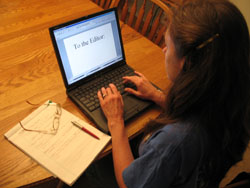 |
|
-May 2006- |
|
The Power of the Pen
Watershed groups and individual citizens concerned about the health of their rivers often do not take advantage of a tool that is literally at their fingertips: writing a letter to the editor (LTE) of your local paper. Why should you consider writing a LTE?
-
It gets the issue into a public forum
-
It offers the opportunity to inform, educate, and engage citizens
-
It lets others know your group's position regarding the issue (as well as letting them know your group exists)
-
It is a legitimate and accepted arena for offering facts and views that are in opposition to other readers, or to an article published in that paper
-
It is an effective means of keeping an issue alive for a longer period of time
-
Letters to the editor are one of the most frequently read sections of a newspaper, and a "must read" section for elected officials
 When should you submit a LTE? Timing of a LTE is critical for effectiveness. If your LTE concerns an issue covered in a published article or by a different form of media, submit it within 24 hours of the story' release. If the purpose of the LTE is to "remind" others that an issue has not been resolved (or was poorly resolved), then timing is more a question of considering other factors such as local political climate or how the LTE fits into your group's own strategy for working on the issue.
When should you submit a LTE? Timing of a LTE is critical for effectiveness. If your LTE concerns an issue covered in a published article or by a different form of media, submit it within 24 hours of the story' release. If the purpose of the LTE is to "remind" others that an issue has not been resolved (or was poorly resolved), then timing is more a question of considering other factors such as local political climate or how the LTE fits into your group's own strategy for working on the issue.
Tips for writing LTEs abound, but the number one step for any writer is to check the newspaper's rules for submitting LTEs. Typically there is a limit to the length of a letter; there may also be a deadline for submission. The best tips for writing LTEs?
-
Keep it short - make one or two points maximum
-
Keep it simple
-
Keep it local - why should people who live and work in your community care about the issue? Why should elected officials care?
-
Keep it personal, but not too personal - including inflammatory language and emotional attacks will not impress the editor or other readers (should the editor even allow your letter to be printed)
-
Check any facts you are including, and then check them again
Having writer's block? Sit (or imagine that you are sitting) with a good friend and tell them what concerns you most about the issue and why. If your friend has an opposing view, respectfully tell them one or two reasons why you disagree. You will find your letter writing itself.
For more information, visit IMPACS (the Institute for Media, Policy and Civil Society) website: http://www.impacs.org. The site includes a Media Toolkit that can be downloaded and that includes tips on how to write a LTE.